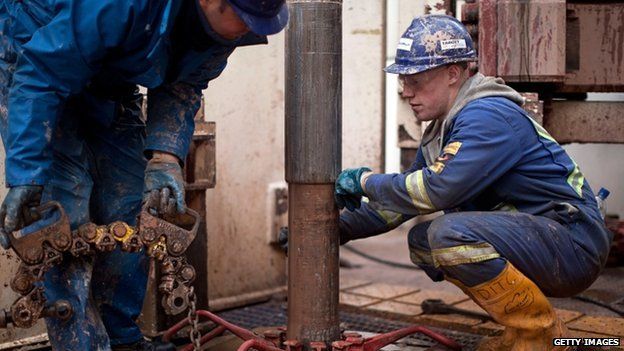Block on fracking in Scotland announced by minister
- Published

The Scottish government has announced a block on planned fracking operations, pending further inquiries.
Ministers will carry out new work on the environmental and health implications of the controversial gas drilling technique.
Full control over fracking is due to be devolved to Scotland after May's general election.
In the meantime, consent for unconventional oil and gas developments will be refused on planning grounds.
The announcement by Scottish Energy Minister Fergus Ewing came a day after the boss of the Grangemouth chemical plant said the UK must embrace shale gas.
Tom Crotty, from Ineos, said high energy prices were damaging the industrial sector.
What is fracking and why is it controversial?
The BBC's David Shukman explains how fracking works
- Fracking is the process of drilling down into the earth before a high-pressure water mixture is directed at the rock to release the gas inside.
- The extensive use of fracking in the US, where it has revolutionised the energy industry, has prompted environmental concerns.
- The first is that fracking uses huge amounts of water that must be transported to the fracking site, at significant environmental cost.
- The second is the worry that potentially carcinogenic chemicals used may escape and contaminate groundwater around the fracking site.
- But the industry suggests fracking of shale gas could contribute significantly to the UK's future energy needs
UKOOG, which represents the onshore oil and gas industry, said the sector would boost Scotland's economy.
But environmental group WWF Scotland said fracking, where gas is extracted from rock, should be ruled out completely.
In the US, extensive use of the process has revolutionised the energy industry.
SNP MP Mike Weir and Labour MSP Lewis Macdonald debate fracking controversies
But opponents have said it causes earthquakes, pollutes water supplies, and could lead to inappropriate development in the countryside.
Mr Ewing said Holyrood ministers had taken a "cautious" approach to fracking, while the UK government had sought to develop it "quickly, at any cost".
He announced:
- A public consultation on unconventional oil and gas extraction
- A public health impact assessment
- Further work to strengthen planning guidance
- A look at tightening environmental regulation
Mr Ewing told the Scottish Parliament that would all "take time", adding: "Given the importance of this work, it would be inappropriate to allow any planning consents in the meantime.
"I'm therefore announcing today a moratorium on the granting of planning consents for all unconventional oil and gas developments, including fracking."
Ken Cronin, chief executive of UKOOG, said Scotland faced having to import most of its gas from less stable countries in the coming years.
He added: "Onshore gas and oil will benefit the Scottish economy, not only directly, with jobs created through oil and gas extraction, but also indirectly, as oil and gas is a critical raw material for the chemicals industry at facilities such as Grangemouth."
But WWF Scotland director Lang Banks said: "There is overwhelming public opinion in favour of cleaner forms of energy and a sufficient body of evidence why unconventional oil and gas are neither good for people or the planet."
Labour's Lewis Macdonald said his party had outlined a list of conditions in the UK parliament which would need to be met before fracking could take place, many of which fell under Scotland's responsibility.
'Political posturing'
"The Scottish government needs to do much more if it is to meet public concern about this issue," Mr Macdonald said.
Conservative MSP Murdo Fraser said the SNP government was more interested in "political posturing" than making decisions based on scientific evidence.
He added: "The Scottish government would rather play politics than take decisions in the best interests of the Scottish economy."
Liam McArthur, of the Liberal Democrats, said: "It's been fascinating to watch Labour and the SNP try to outdo each other in sounding sceptical about fracking, which they both support."
Green MSP Alison Johnstone welcomed the Scottish government's move, but added: "A moratorium is only a delay or a suspension."
On Monday, MPs overwhelmingly rejected a House of Commons amendment calling for a fracking moratorium by 308 votes to 52.
The UK government has agreed to tighten the restrictions on where the process can take place, with an outright ban on the activity in national parks, sites of special interest and areas of national beauty.
Full powers over fracking are to be devolved to the Scottish Parliament, after the Smith Commission on strengthening Holyrood recommended it should get control over onshore licensing and mineral access rights.
A spokesman from the Department of Energy and Climate Change said: "Any decision on whether shale developments can occur in Scotland is and always has been a matter for the Scottish government. The Scottish government has substantial control of onshore oil and gas activities through planning controls and environmental regulation as these are devolved.
"The government continues to carefully consider applications received as part of the 14th onshore licensing round. These include applications for licences in Scotland."
- Published26 October 2022
- Published13 December 2012
- Published16 July 2013